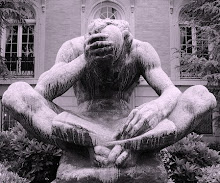I actually don't like atheists like this. People like Gervais are continually giving the same, trite message. It boils down to "nuh-uh." Sure, some people say it in startling ways aimed at shocking people (like that magazine cover) more than communicating with them. Sure, some people (like Richard Dawkins) say it more artfully and convincingly. But it still boils down to "nuh-uh."
Make no mistake, "there's no God" is a message just as surely as "Jesus died for your sins" or "Allah is the one true God and Mohammed is his prophet" is a message. (NB: Atheists, when you put it on the side of a bus, it counts as a message.) What I think would profit everyone a bit more is some cohesion on the atheists' part. I would be more willing to take you seriously if your platform wasn't based on "Faith is the great cop-out, the great excuse to evade the need to think and evaluate evidence. Faith is belief in spite of, even perhaps because of, the lack of evidence." Those are Dawkins' words He even set up his own foundation "to overcome religious fundamentalism, superstition, intolerance and human suffering." But what the foundation seems really to focus on is the first on that list (overcoming religious fundamentalism) instead of what is listed last (overcoming human suffering). Their "Projects" pages lists lots of things like conferences, interviews with religious figures, fundraisers, DVD sales, etc. What are they doing to help alleviate human suffering? They set up a Paypal account to funnel money to Oxfam for disaster relief. Wow.
The thing is, people are smart. Start doing the things that the Catholic church has done: open a hospital (you could put a little blank frame above each bed instead of a crucifix) or orphanage (you could save children from indoctrination at the hands of those religious people who run orphanages) or disaster relief organization (you could save people without them having to, you know, be "saved"). Do that, and maybe people will take you a little more seriously. Do that, and maybe more people will listen to your message.
It actually boggles my mind that atheists of all people aren't more involved with this sort of thing. If what you believe in is the human, that this life is all we've got, then I would expect a little more attention to human suffering. With religious folks, there's an out: people who suffer or are poor or are sick will get their real reward in the afterlife. Religious folk tend to worry more about the state of the soul. With atheists, there is no afterlife, so human suffering, poverty, sickness is all there is unless it is remedied in the here and now. Atheists should be a bit more worried about the state of the body and mind.
Now, that's not to say that I dislike all atheists (some non-believers I have known are the most moral and upstanding people I've ever met). That's also not to say there are no atheists who aren't doing this. Linus Pauling, Barbara Ehrenreich, Jawaharlal Nehru, Lance Armstrong, Ian McKellen, Che Guevara, and Henry Rollins are/were all atheists (you might not like what they did/are doing, but at least they're working to better people's lives in the way they see fit). It's just that the loudest ones seem to be intent on tearing down religion rather than building up a supportive structure for humans...what would seem to be the job of secular humanists. Create a supportive structure for people, and maybe you'll win/free more hearts and minds. Because that's the ostensible intent of most vocal atheists. But I don't see how pissing on organized religion, parodying the crucifixion, arguing with prominent religious figures on TV or in print advances your cause. It makes you seem small. It makes you seem bitter. You're dashing most of your energies against an entrenched mindset. You'd be much more successful ignoring the religious doubters and naysayers, leaving off trying to show how religion is wrong. Instead, show us how you're right.
Personally, I don't think you can (if for no other reason than Pascal's Wager). But even if the effort were totally futile, look at all the good you would have done along the way.

